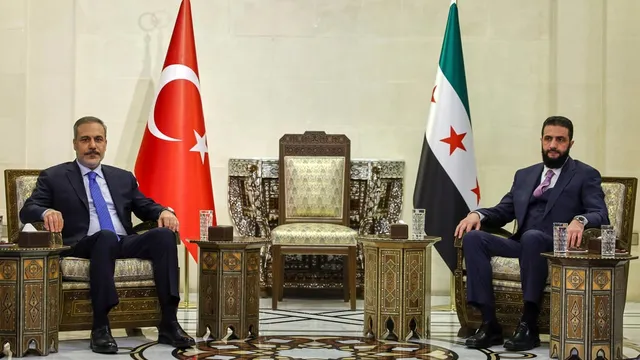
Turkey aims to avoid conflict with Israel in Syria
2025-04-10 04:20- Turkey's Foreign Minister Hakan Fidan expressed that Ankara does not want armed conflict with Israel in Syria.
- The Israeli military has intensified its airstrikes, impacting Turkish efforts to stabilize its influence in Syria.
- Technical talks are being held between Turkey and Israel to prevent military misunderstandings, despite deteriorating relations.
Express your sentiment!
Insights
Turkey, a NATO member, has been navigating its complicated relationship with Israel amidst heightened tensions in Syria. In recent statements, Turkey's Foreign Minister Hakan Fidan emphasized Ankara's desire to avoid armed conflict with Israel, particularly as the Israeli military has intensified its airstrikes in Syria. These actions have been seen as detrimental to Turkey's strategic interests in the region, especially concerning efforts to combat threats from groups like the Islamic State and to support the Syrian government. According to reports, Turkey is pursuing technical talks with Israel aimed at preventing misunderstandings between their military operations, although these discussions are not aimed at normalizing relations. Fidan’s remarks come at a time when Turkey has been criticized internationally for its military presence and actions within Syria. A Qatari report suggested that Ankara has made agreements with the regime in Damascus which involve establishing several Turkish military bases within Syrian territory. This has raised concerns from analysts regarding Turkey's influence and role in reshaping the political landscape in Syria, particularly after the perceived decline of Russian influence following the conflict. Tensions escalated further as Fidan noted that Israel’s ongoing strikes are destructive to the stability efforts of the Syrian government. He pointed out that these attacks negatively impact efforts led by the Syrian group Hay’at Tahrir al-Sham against various threats, which complicates the overall security environment in the area. Despite Israel's justifications for its military actions, Fidan's comments underscore a deeper concern about the ramifications of continued Israeli involvement in Syria and its implications for Turkey's strategic position in the Middle East. Amidst these developments, the relationship between Turkey and Israel has reached a historical low. Recent statements from Turkish President Recep Tayyip Erdoğan, including his public calls for the destruction of Israel, have further strained bilateral relations. Despite Turkey’s criticisms and actions, Fidan reaffirmed that Ankara seeks to avoid any confrontation with Israel, emphasizing the sovereignty of Syria and its alignment with the interests of its people. The complex interplay of military, political, and diplomatic considerations continues to shape the prospective future of Turkish-Israeli relations in a highly volatile region.
Contexts
Turkey and Israel have a historically complex relationship marked by periods of cooperation and tension. Diplomatic ties were established in the early 20th century, but relations began to shift significantly after the Cold War. In the late 1990s, both countries formed a strategic alliance, characterized by military cooperation and trade agreements that contributed to a strong bilateral relationship. However, this partnership began to deteriorate in the late 2000s over divergent political stances, particularly regarding the Israeli-Palestinian conflict and Turkey's support for Hamas. The 2010 Gaza flotilla incident, wherein Israeli forces boarded a Turkish ship attempting to break the blockade on Gaza, further strained ties, leading to the withdrawal of ambassadors and the cessation of military cooperation. In the following years, attempts were made to mend relations, culminating in the normalization agreement in 2016, which allowed for the exchange of ambassadors and resumed diplomatic dialogue. However, underlying tensions continued, with Turkey's vocal criticism of Israeli policies in Gaza and the West Bank. The U.S. recognition of Jerusalem as Israel's capital in 2017 exacerbated these tensions, leading to Turkey's withdrawal from a joint project with Israel and the call for boycotts against Israeli goods. Despite these challenges, economic ties have persisted, with both countries engaging in significant trade, particularly in the fields of energy, tourism, and agriculture. In recent years, geopolitical dynamics have played a pivotal role in shaping Turkey-Israel relations. Turkey's aspirations to exert greater influence in the Middle East have sometimes led to competing interests with Israel, especially regarding energy exploration in the Eastern Mediterranean. However, both countries have shown a willingness to engage in dialogue to address mutual concerns, particularly in light of common adversaries such as Iran. This geopolitical landscape raises questions about the future of their relationship, as both nations navigate a complex web of alliances and rivalries. As of April 2025, Turkey-Israel relations appear to be characterized by a cautious pragmatic approach. Recent developments, including joint energy projects and potential collaborations in technology and defense industries, suggest that both countries recognize the importance of dialogue and cooperation despite their fundamental differences. For the future, the trajectory of Turkey-Israel relations will likely depend on broader regional dynamics, the evolution of the Israeli-Palestinian conflict, and each country's domestic political considerations.